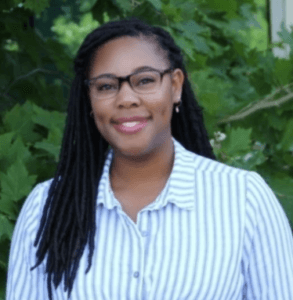Guest Blog by Dr. Mayen B. Udoetuk
Director, Program and Partner Development at UCSC Silicon Valley Extension

Black History Month is often a time in which many Americans learn, for the first time, the innumerable people and events from the African Diaspora and the countless contributions of Black people to this nation. Make no mistake – Black history is indeed American history. Yet some Americans submit requests for their children to “opt out” of Black history school lessons while simultaneously enjoying everyday inventions afforded to them by the very Black people featured in those lessons. For those of us who opted into learning Black history, we frequently did so via supplemental instruction to whitewashed core K-12 curricula, college electives as opposed to university required courses, discontinued TV shows, classic films, PBS documentaries, and family oral histories. In those moments of learning and celebrating Black history, I can’t help but to wonder if we’re doing so passively each February, or actively throughout each year…
“You’re a Black history fact in the making”. These uplifting words were written on a greeting card I recently received from a dear friend. When you think about it, it’s an interesting juxtaposition. Those words illustrate boundless future prospects, while illuminating the fact that there’s still so much work to be done. In 2021, we’re living in a day and age in which Black people are still experiencing so many “firsts”. This past January, we witnessed Kamala Harris become our country’s first female vice president, while also being the first Black American and first Asian American vice president. In 2020, Dr. Michael Drake became the first Black president of the 152-year old UC system. In 2008, Barack Obama became America’s first Black president. While these examples of Black Excellence demonstrate the possibilities, it’s hard to ignore the challenges.
For those of us that value Black History and the meaning of Black History Month, we recognize the mockery found when the celebration of past Black lives is incongruent to the preservation of current Black lives. We know allyship is performative when natural disasters and global pandemics disproportionately affect marginalized communities. We witness performative support of Black lives when companies appoint Chief Diversity Officers without supportive teams, sufficient budgets, or the critical workplace accountability that promotes positive change. We see evidence of fraudulent support when justice fails to be served after members of the Black community are unlawfully and savagely forced from living beings to hashtags. While we need newly instated policies in the names of the slain, racist caricatures removed from household brands, and sincere corporate public apologies partnered with real change to oppressive systems, let me be clear – Black History Month celebrations do not equate to justice.
If you’re not convinced of your ability to make a difference in support of Black lives, I invite you to consider otherwise. This is by no means an exhaustive list or a set of conscience clearing actions. These are small steps that can eventually add up to a measurable positive changes:
- Educate yourself on racial equality and social justice
- Make purchases from Black owned businesses without requesting discounts or special treatment
- Donate to organizations that aim to reduce disparities in the Black community
- Sincerely connect with Black neighbors, friends, family, employees, colleagues, etc.
- Refuse to be a hidden ally and speak up in non-Black spaces against racism
- Avoid gaslighting and diminishing the Black lived experience
Black history is then, and it is now. Opportunities to unlearn lies told about Black Americans while celebrating powerful truths exist in each new February, and the time between those Februarys. Let’s continue to honor past struggles as we lay the foundation for future triumphs. Cheers to the Black firsts that become so common, that they’re not “firsts” anymore.
###
Dr. Mayen B. Udoetuk is a Chemist, Educational Psychologist, and Higher Ed professional who provides expertise to Silicon Valley by developing programs and industry partnerships intended to resolve highly complex training issues among professionals across industries. Her objective is to assist organizations with closing skills gaps while reducing diversity, equity, and inclusion disparities.
LinkedIn: https://tinyurl.com/3sr5kdru
Instagram: @mayenbu
February 23, 2021




